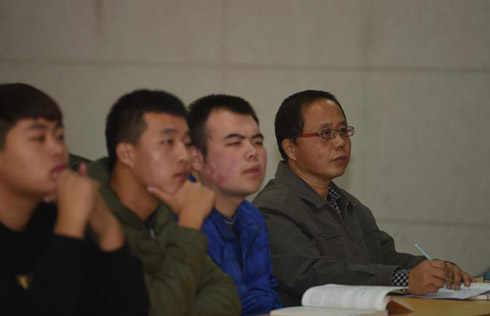Book to the future
 |
|
Some of the books donated by the Reading Dream Program in Ruyi.[Photo/China Daily] |
He then spent two days browsing Shaoshan's only bookstore, looking for children's books. He didn't want used volumes; he wanted new ones "because the 'feel' is important to young readers. The smooth texture and the rustling sound of the paper can make them more interested in reading."
Returning to Hong Kong, Leung began drafting a five-year blueprint. He started knocking on the doors of potential sponsors. It was a slow beginning. Few potential donors were impressed because they thought the project was grandiose and unlikely to succeed.
Some of Leung's friends worried about his personal life and wondered if he would have time for himself after taking on such an enormous responsibility. The lack of a stable income was another concern
Success came slowly, but eventually he found three sponsors in Hong Kong and bought 100 pieces of furniture; desks, chairs and bookshelves. A few days before Chinese New Year 1998, he kept his promise and returned to Shaoshan with 30,000 yuan ($4,570) in his pocket.
Reading the runes
Leung established a 30-minute reading session as a compulsory part of the daily routine. There was also work to be done with the teachers, who had to be competent to teach the children how to read independently.
The students received their new study materials eagerly and were soon absorbed in their new books. "Sometimes they frowned. Sometimes they looked sad and nervous, but as they read on I saw their furrowed brows relax. They smiled and even laughed out loud," Leung recalled. "Their expressions of rapt attention lifted my heart. I felt all the effort had been worthwhile."
He began to see a future for the children - of flexible minds, problem-solving skills, the ability to form opinions, expanded creativity and articulate expression. All these can be shaped through reading, he said, adding that the teacher's role is to "ask good questions "as they guide their students' reading development.
After three months, the teachers saw the results: Students who had only been able to give inarticulate accounts of the stories they read could now relate entire narrative arcs in logical sequences, while the more-advanced students offered their own insights when asked. They all became more comfortable when speaking in class.
Leung set about extending the program to other rural schools in Hunan, but many teachers were unhappy. They complained about the extra workload. The compulsory reading sessions were not implemented, and the time set aside for them was reallocated for students to do their homework instead. Leung's confidence was shaken.
"The schools in those poor villages welcomed donations of books, cash and physical items. They were less interested in reading programs that could take a while to bear fruit," he said.
In frustration, Leung visited the school authorities in Shaoshan, where he received a more enthusiastic reception. He began sitting in classrooms across Shaoshan from 8 am until 5 pm, monitoring the reinstated reading sessions and training teachers.




























